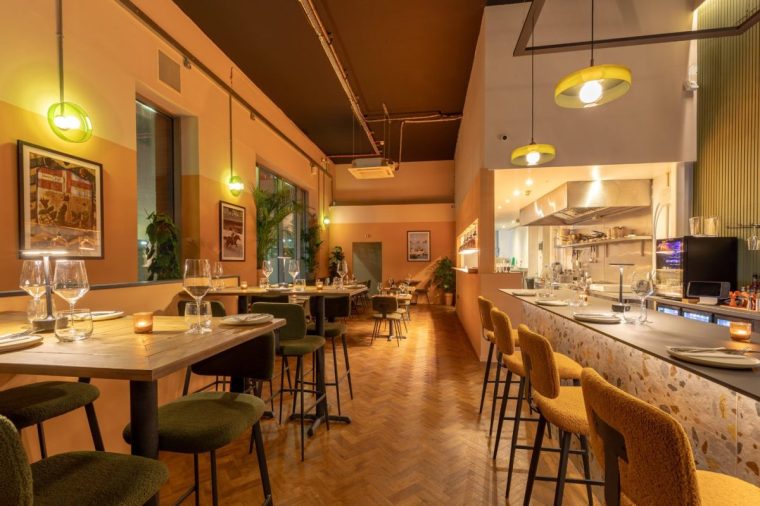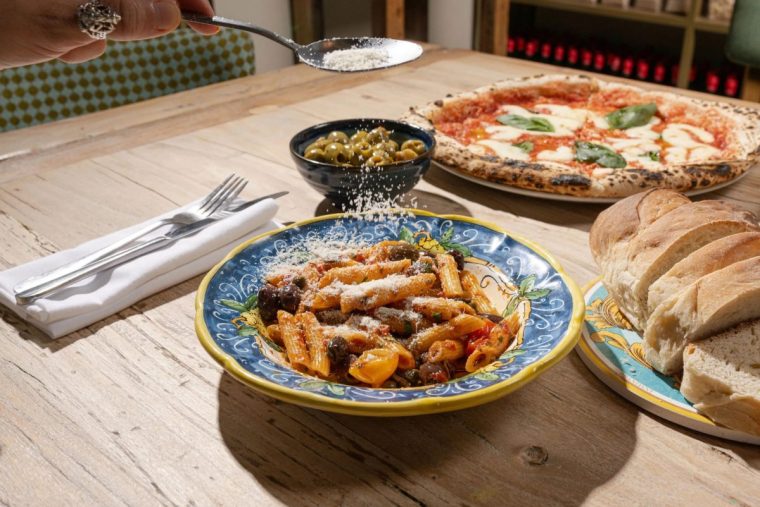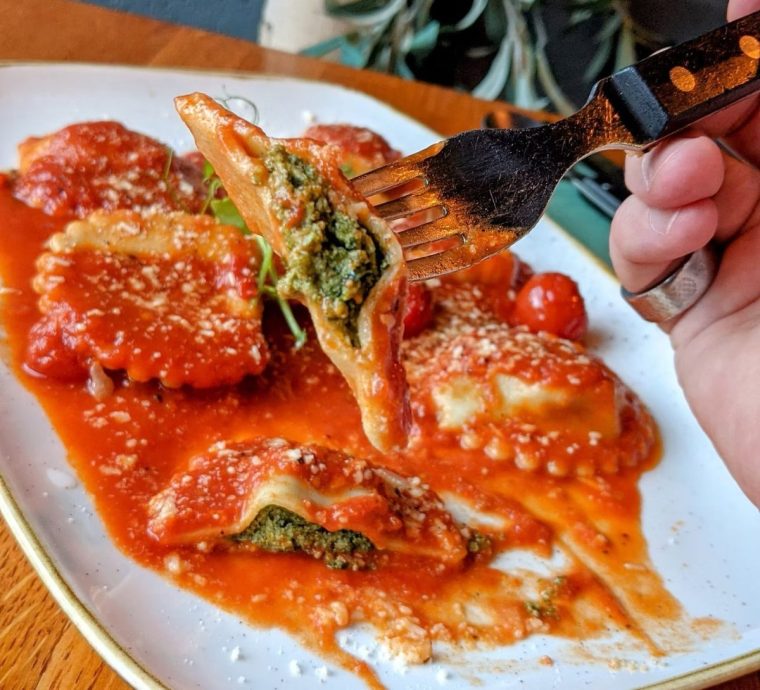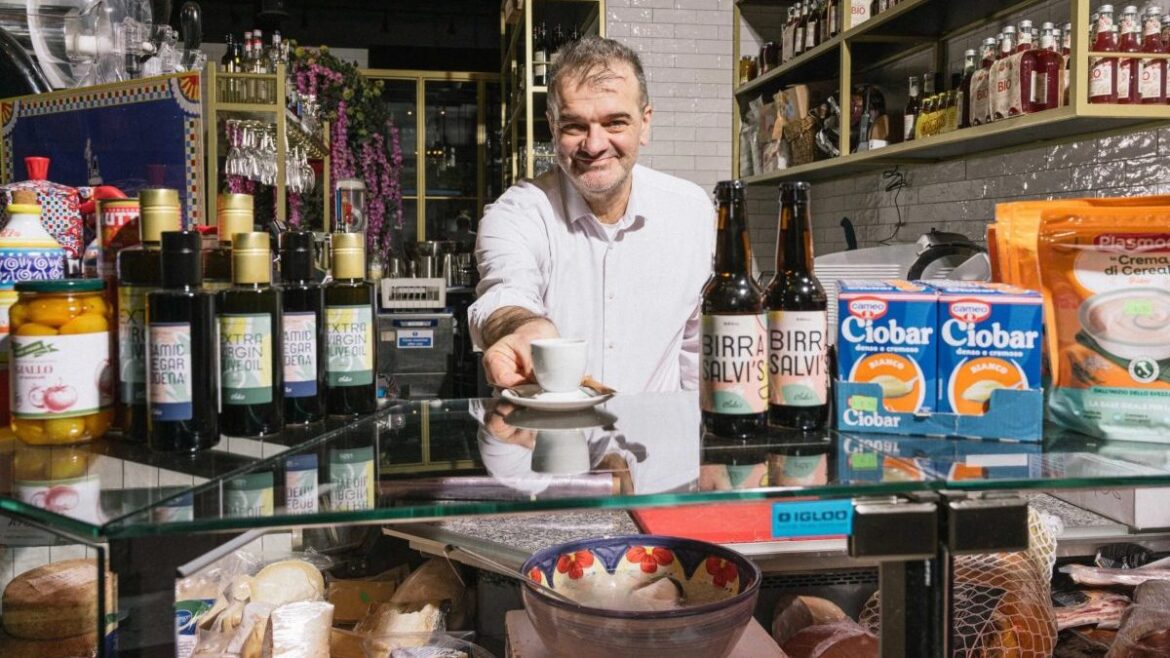It’s midweek, a very warm evening in June. Cosimo, a Neapolitan chef, is talking loudly in the open kitchen. The focaccia in front of me is as fresh and soft as in Italy, and only the sight of a car driving on the left side of the road outside brings me back to reality – and to Manchester.
I’m at Bruco, a sleek, modern spot in the Ancoats area – one of several Italian restaurants to have opened across the city in recent months. The name is a reference to its location: “bruco” means caterpillar, and here it refers to silkworms – a nod to Ancoats’ history of textile manufacturing. It also alludes to a specific contrada (district) in Siena, likewise known for its connection to textiles. With Ancoats known as Little Italy in the late 19th and early 20th centuries, due to an influx of Italian immigrants seeking work in the factories, it all feels fitting. The area is now Manchester’s hottest dining destination for all sorts of cuisines, and while the ice cream cone was invented here by Italian Antonio Valvona in 1902, restaurants run by his compatriots can now be found all over the city.
While Manchester has been known as a foodie city for some time, but lately it’s undergoing what Bruco’s owner Ethan Harvey calls a “fresh pasta renaissance”. He explains that “people are long past the book-length menus of traditional Italian restaurants; they want fresh, seasonal food”. And I have to agree. Manchester has seen countless food trends come and go, restaurants open and close, yet Italian cuisine is still popular – so much so that London-based, Italian-inspired chains like Lina Stores, Circolo Popolare and Pizza Pilgrims have headed up the M6 and opened up shop.
 Bruco, one of Manchester’s new wave of Italian restaurants (Photo: Carl Sukonik/The Vain Photography)
Bruco, one of Manchester’s new wave of Italian restaurants (Photo: Carl Sukonik/The Vain Photography)
I’m happy to say that Italian dining in Manchester is a world away from how it was eight years ago, when I first moved here from a town near Milan. Back then, I was naively lured into restaurants with Italian-sounding names and soon discovered that the only thing resembling a taste of home was the imported breadsticks. I didn’t know restaurants could legally put mushrooms in a carbonara.
A year later, I attended Festa Italiana, the UK’s largest Italian food festival, held annually in Manchester’s Cathedral Gardens. The free, three-day event has been running since 2018, and last year its stalls and chef demos attracted more than 40,000 people. The event was founded by Maurizio Cecco, owner of Salvi’s, a pair of restaurant-delis that have become a staple of the city’s Italian food scene since the first opened in 2010. The Exchange Square branch is also my personal refuge when I’m craving products from home – especially since Brexit has made receiving il pacco da giù – literally, “the box from down below”, as we Italians call food parcels sent by family who don’t trust we’re eating properly abroad – that little bit harder.
I ask Ezio, manager of Salvi’s Exchange Square, what he thinks Brits love most about Italian food. “Spicy stuff, like ’nduja”, he says, glancing over at the outdoor tables, which as usual is packed with diners who’ve just finished shopping or are gearing up to brave the crowds of the Arndale Centre. “Oh, and flavours they tried on holiday in Italy and want to enjoy here too – like truffle pesto. We can’t keep it on the shelves,” he tells me with a laugh.
 Salvi’s serves authentic-tasting Italian dishes in its downstairs dining room (Photo: Salvi’s)
Salvi’s serves authentic-tasting Italian dishes in its downstairs dining room (Photo: Salvi’s)
And he’s right. Italian food has really taken off in Manchester. You can now find burrata, stracciatella, guanciale on its packed shelves – things I couldn’t have imagined seeing not too long ago. The restaurant downstairs is probably one of the cosiest and quietest spots in town for a bite, with a pizza oven just like any you’ll find in Naples, and neon-coloured drinks that will brighten even the drizzliest of Mancunian days.
This evolution is echoed by Beppe Piccoli, owner of Vero Moderno – another Italian favourite in Manchester, serving Roman-style dishes which has been serving Roman-style dishes for over nine years in Salford, a short walk across the River Irwell from Deansgate. The decor is modern and the tables much bigger than average, leaving no room for misunderstandings: you will eat and drink a lot.
“British customers are definitely refining their tastes”, he tells me. “They’re slowly moving away from Britalian dishes like carbonara smothered in cream and bacon and starting to try original Italian recipes – even if they don’t always know what they are.”
 Ravioli in tomato sauce at Vero Moderno (Photo: Vero Moderno)
Ravioli in tomato sauce at Vero Moderno (Photo: Vero Moderno)
As we speak, a group of five Irish lads sits down at the table next to ours, excitedly discussing the menu, which includes specialities like maltagliati (chopped pasta with asparagus in a pepper sauce) and suppli’ di riso (Roman arancini filled with beef ragu and mozzarella), but also mini burgers. Beppe looks at me and says: “Still, we need to cater to their tastes – we are in England, after all”, before rushing behind the bar to prepare cocktails for the Saturday bottomless brunch menu. That’s something I’ve never quite understood, even after years of living here. Surely, bottomless food is better than bottomless drinks. Perhaps I’m just not that British yet.
Despite strides forward in offering classic Italian dishes, the “Britalianisation” of the cuisine in Manchester is undeniable. From Vero Moderno’s brunch to Bruco’s “Full Italian” panuozzo – a hybrid of a full English breakfast and a Neapolitan-style sandwich – experimentation is clearly welcome. “I have to admit, until we added ‘Italian pizza sandwich’ next to panuozzo, no one really ordered it,” Ethan tells me. “But once we did, it was a huge success.”
And it’s not just about breakfast or brunch. A new pizzeria called Forbici – meaning scissors in Italian, a nod to how we often cut pizza back home – opened in central Manchester in April and has really embraced local ingredients, regularly topping their pizzas with local ingredients like Bury black pudding. One upon a time that would have been a shock, but nothing really surprises me anymore. If anything, riffs like this on my country’s cuisine excite me. Because while Italy will always be home, Manchester is starting to taste a lot like it.


Dining and Cooking